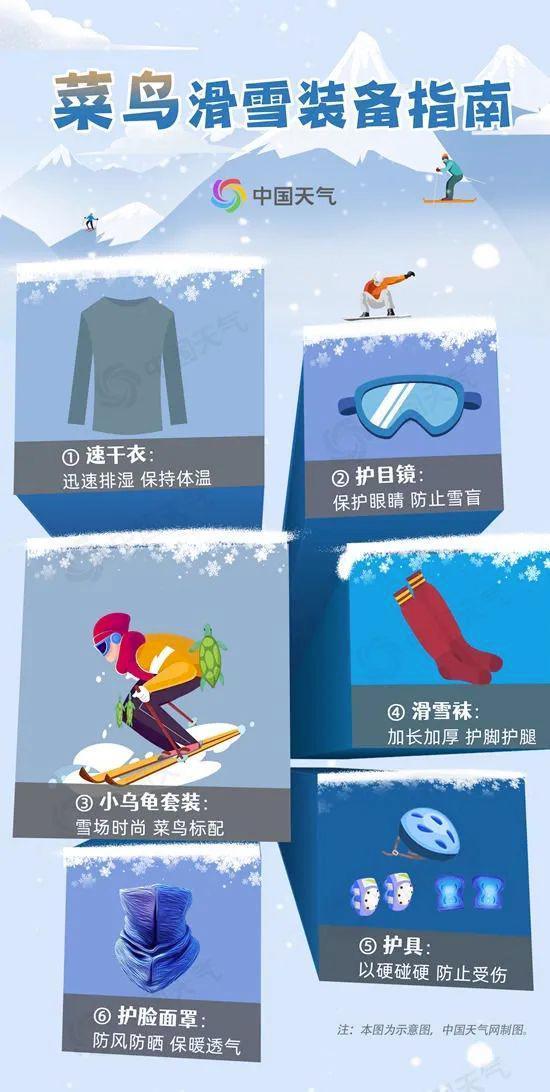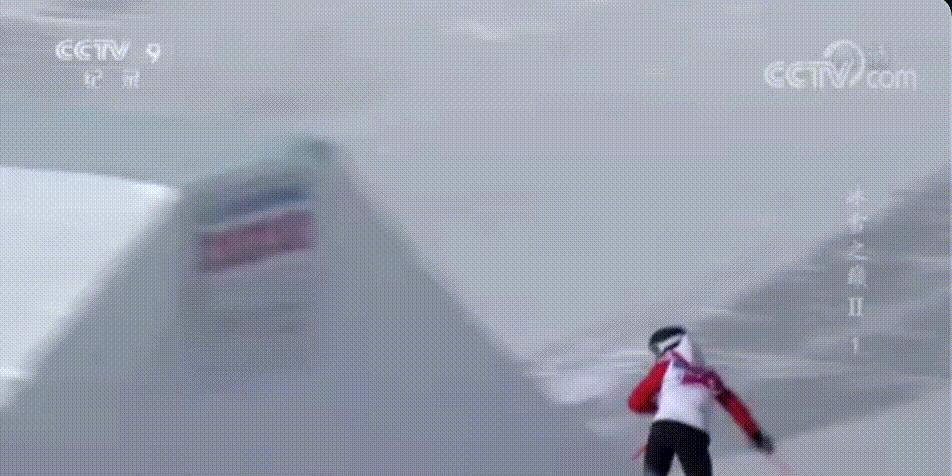Happy health | Skiing is afraid of injury? Learning these will help you avoid risks.
This article is transferred from: Workers Daily

The footsteps of the Beijing Winter Olympics are getting closer and closer, and people’s enthusiasm for ice and snow sports is getting higher and higher. Recently, the rainy and snowy weather in Beijing, Henan, Hubei and other places has increased, and many people are more eager to ski and skate.
Skiing can bring fresh and exciting feelings and meet the needs of leisure and decompression, but it may also lead to falls and injuries if you are not careful. Today, this article will tell the snow field "Xiaobai" how to avoid risks and how to deal with injuries such as frostbite, bone injury and snow blindness.
Beginners learn how to fall before they learn skiing.
Learn how to fall properly before you learn skiing. During skiing, if you feel that you have lost your center of gravity and can’t control your speed, skiers can quickly bend their knees to lower their center of gravity. If you have a snow pole in your hand, remember to loosen it, stretch your arms naturally and sit your hips up the hill. The skis are slightly raised to prevent rolling.
A guide for novice skiers to "get on the field"
1. Follow the protective points told by the coach.
Before beginners ski, it is best to learn a few tricks from professional coaches, including how to start safely, "brake", fall and get up. In addition, it is necessary to understand the norms of skiing itself, as well as the environmental facilities and management system of ski resorts, especially the terrain, snow quality, weather, crowd density, signal boards, signs and warning signs related to safety.
2. Go to a well-equipped venue to play.
Beginners should try to avoid going to informal ski resorts and skiing in the wild. Although informal ski resorts save money, there are many security risks because there are no management and protective measures. In addition, under normal circumstances, skiers can get corresponding compensation from ski resort operators and insurance companies if they are injured in the snow track of regular ski resorts, but if they are accidentally injured during "skiing in the wild", the expenses such as treatment can only be borne by themselves.
3. Choose protective equipment that suits you.
When choosing skiing equipment, skis, snowshoes, anchors and ski pole are all necessities. The snowboard for beginners with double boards should not be too short, but it should not be longer than the height. For those who plan to ski for a long time, it is best to equip themselves with a full set of skiing equipment. Appropriate taxiing equipment is the guarantee of taxiing safety. The protective gear of ski equipment includes helmet, snow goggles, mask, wristband, gloves, knee pads, hip pads and armor from head to toe.

Ski "masters" should always guard against danger.
In skiing, beginners and intermediate skiers should prevent skiing injuries, and the "masters" in the snow field should also be vigilant.
For the ski "Xiaobai", you must not be "fearless" when you first enter the snow field. You should practice and receive formal training off the field first, and master certain basic skiing movements before you go on the field, which is conducive to preventing the injury of ice and snow sports.
Intermediate skiers who have mastered conventional techniques should pay attention to increasing physical training in peacetime, especially the muscle strength training of lower limbs. The data show that 60% of serious skiing injuries occur in the knee joint, such as cruciate ligament injury and meniscus injury. These injuries will have an irreversible impact on the knee joint.
Do the "masters" of the snow field also need to worry? The answer is yes. Although there is nothing wrong with the skills, physical fitness and experience of the "master", we should pay special attention to the sports injuries caused by external factors, such as a large number of skiers and a high density of people. The "master" should also pay attention to observing the surroundings to avoid being accidentally collided by skiers with other skills.
In addition, with the gradual warming of the temperature, some areas on the snowy road are easy to turn snow into ice, and the friction coefficient changes obviously, so it is easy to fall when sliding to these areas. Ski lovers should carefully observe the situation of snow trails to prevent falls.

What should I do if I get injured on the snow field?
As the saying goes, there are no wet shoes when walking by the river. For skiers, it is inevitable that injuries will occur on the snow field. After the following injuries occur, they can be handled according to the corresponding methods.
frostbite
Skiers are most prone to hypothermia and frostbite because of the low temperature in the snow field. Once this happens, skiers should leave the low-temperature field immediately and change their wet clothes, shoes and socks in time. You can soak the frostbitten area with warm water at 40℃ and put on thick clothes to keep warm. But pay special attention to, can’t immediately fire, or soak in high temperature water. Don’t take off your elastic socks for frostbite and blisters on your feet, and then treat them after rewarming and swelling.
Joint and ligament injury
Skiing falls are often accompanied by sprained ankles and knees, elbow and shoulder injuries, and sometimes dislocations. Once you sprain, your joints can’t bear weight or your activities are obviously limited, you should immediately call rescuers. You need to go to a hospital with the ability to treat the injury and treat it in time to avoid leaving sequelae.
Muscle injury
If you exercise for too long, don’t panic when you encounter spasm. Just gently try to pull the injured muscle in the opposite direction to lengthen it, and the pain will be relieved. What needs to be paid attention to is that after putting on the equipment in the ski resort, don’t rush to the snowy road immediately, but do a few stretching actions seriously to fully activate the parts that are about to be stressed, so as to make them more flexible in sports.
Bone injury
Once a fracture occurs during skiing, don’t move, let alone massage or pull, because the fracture is likely to damage the surrounding blood vessels, causing congestion and edema, further increasing the difficulty of treatment. You should lie flat immediately and call rescuers.
Eye injury
The reflection of snow is very strong. If you are completely naked when skiing, you are prone to snow blindness. It is best to equip with professional ski glasses. If there are symptoms of snow blindness, don’t rub your eyes with your hands. Wash your eyes with pure water or eye drops, then cover your eyes with soft medical cotton yarn and close your eyes to rest.

Health science-what is snow blindness?
"Snow blindness" is an inflammation caused by the damage to cornea and conjunctival epithelium caused by strong sunlight reflected through snow, which is called "electro-optic ophthalmia". Usually, the eyes will be stinging and burning, and there is even the danger of temporary blindness, which mostly happens in snow and glaciers in high mountains.
Therefore, try not to have fun in the snow for too long on a sunny day, and it is best to control it within 1~2 hours. If you don’t enjoy yourself for too short a time, you should take protective measures for your eyes. You can wear sunglasses to prevent strong light from irritating your eyes.
Will a large-scale epidemic come back during the Spring Festival?
On the afternoon of January 22nd, the joint prevention and control mechanism of the State Council held a press conference on epidemic prevention and control during the festival.
Liang Wannian, head of the expert group of the epidemic response and disposal leading group of the National Health and Wellness Commission, said that as the Spring Festival holiday approaches, the flow and gathering of people will increase, which will indeed increase the risk of epidemic spread. However, as long as the current prevention and control strategies and measures in China are strictly implemented, and as long as we ordinary people effectively carry out personal prevention and control, such as vaccination, wearing masks, washing hands frequently and trying not to gather as much as possible, this risk can be effectively avoided or even controlled.
On the whole, it is unlikely that a large-scale epidemic will come back due to the flow and gathering of people during the Spring Festival holiday.
How to visit relatives and friends and hold banquets during the Spring Festival? Mao Dezhi, deputy director of the Rural Cooperative Economic Guidance Department of the Ministry of Agriculture and Rural Affairs and a first-class inspector, said that it is necessary to celebrate festivals and effectively prevent epidemics. There are four reminders and suggestions:
First, try to reduce visits, visits and dinners. If you really need to go out, you must wear a mask scientifically, change it on time, wash your hands frequently, keep less contact and keep a certain distance. If you have fever or abnormal conditions, you should report and see a doctor at the first time.
Second, if farmers have family gatherings or hold banquets during the Spring Festival, they should strictly follow the requirements of local epidemic prevention and control, try to reduce the scale of personnel and avoid large-scale gathering.
Third, rural grass-roots organizations should take various effective ways to strengthen publicity, education and guidance in a deep and lasting way, and enhance farmers’ awareness of self-protection. At the same time, we must do a good job in the plan, and start the corresponding plan in time once there is a situation.
Fourth, there may be places where people gather in rural areas, such as restaurants, hotels, homestays, bazaars, etc., and special attention should be paid to implementing the regulations on epidemic prevention and control. For example, people should take temperature measurements, scan codes, and wear masks when entering and leaving. At the same time, ventilation and disinfection should be strengthened in these places.
(Part of this article is integrated from Peking University Third Hospital, Health China, Xinhua News Agency, Popular Science China, Beijing Yanqing WeChat WeChat official account)
Reporting/feedback